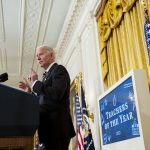President Biden sure knows how to drag his feet when it comes to delivering on promises to rural America. Nearly three years after signing off on a $42.5 billion federal modernization program to bring high-speed internet to rural areas, not a single household or business has been connected. Talk about broadband that’s slower than dial-up! And don’t hold your breath—no project is set to break ground until sometime next year.
Lawmakers and internet companies are pointing fingers at the usual suspects—burdensome requirements. Regulations ranging from climate change mandates to preferences for union labor and hiring “justice-impacted” individuals (yes, that means people with criminal records) are the albatross around this program’s neck. The Commerce Department, the wise overseer of this Broadband Equity Access and Deployment (BEAD) program, is also trying to meddle with consumer rates. Naturally, this has internet providers and congressional Republicans seeing red—and not the Democratic kind.
$42.5 billion. 'Americans still waiting on Biden broadband plan; rural high-speed internet stuck in Dems’ red tape; Not a single home connected three years after enactment.' From @susanferrechio https://t.co/NF1G4AWH3T
— Byron York (@ByronYork) June 19, 2024
At the pace this federal behemoth is crawling, expect anything resembling progress around 2025 or 2026, if we’re lucky. Federal Communications Commissioner Brendan Carr says the true goal of getting high-speed internet to underserved areas won’t be fully reached until 2030. Not exactly the ‘pipe dream’ of rural America, is it? Many rural areas are stuck with prehistoric internet running over copper lines or worse, no internet at all. Despite all of Biden’s fanfare, there’s not a single shovel in the dirt.
A slew of states have gotten approved for BEAD, but that’s just the tip of this bureaucratic iceberg. Alan Davidson, head of the Commerce Department’s National Telecommunications and Information Administration, boasted before lawmakers that the first two years were merely about “planning and preparation.” He claims 2024 will be the big year of execution, but one wonders if they’ve executed anything other than their time.
Detractors of this snail-paced project have no shortage of complaints. Senator after senator, Internet Service Providers, and everyday rural Americans are fuming over the program’s bureaucratic red tape. Those so-called “progressive ideas” like climate change stipulations and workforce diversity requirements have only muddied the waters and delayed projects even further. Eleven Republican senators have expressed their discontent, stating that these added rules divert resources away from actually connecting rural America and misuse taxpayer money.
To make matters worse, BEAD’s preference for union workers and restrictive focus on expensive fiber-optic broadband are conflicting with congressional intent. This might just be a ploy to keep rural America in the dark a bit longer and funnel taxpayer money down the usual liberal drain. The nine-step review process critics say is bogging states down with excessive bureaucracy is just another example of government inefficiency at its finest.
Meanwhile, the Biden administration continues to pat itself on the back, rolling out the same old tired lines about closing the digital divide. Alan Davidson proudly proclaimed the approval of billions for states like Kansas, Nevada, and West Virginia to start “planning and implementing” high-speed internet rollout. But until rural America sees actual results, the grand promises of the Biden administration remain nothing more than empty rhetoric.




